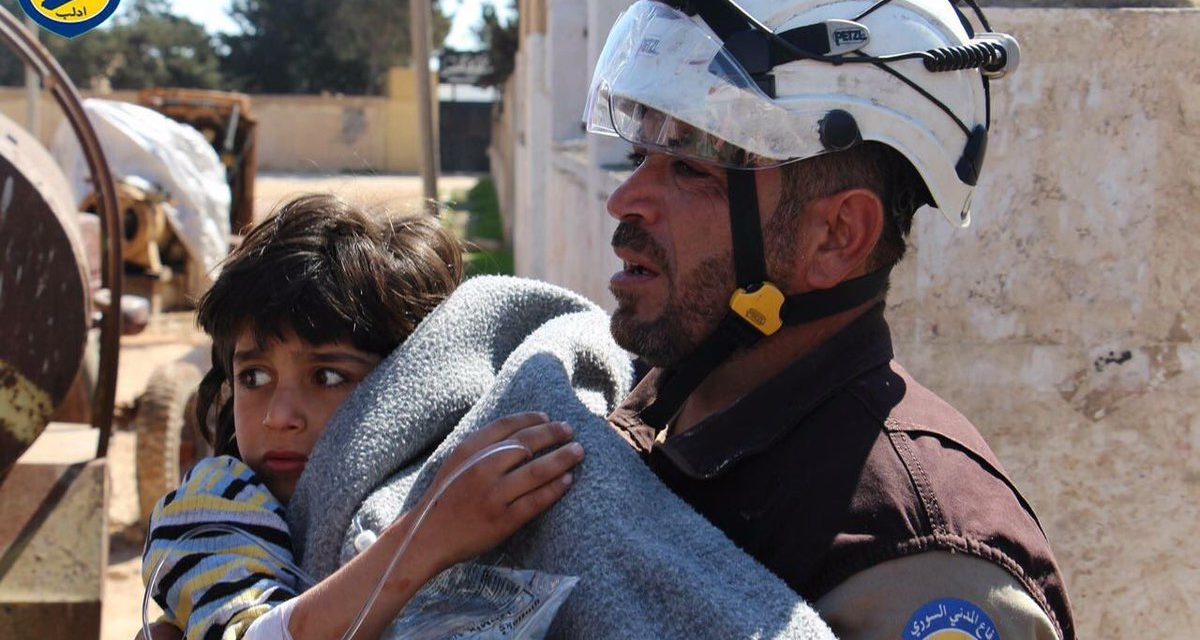A White Helmets rescuer carries a child away from scene of sarin attack on Khan Sheikhoun in northwest Syria, April 4, 2017
A UN Security Council session has called out the Assad regime over its ongoing refusal to declare all of its chemical weapons, almost nine years after it launched a series of more than 300 chlorine and sarin attacks inside Syria.
The session considered the latest report from the Organization for the Prohibition of Chemical Weapons, the international watchdog which has regularly criticized the regime over the failure to failure its 2013 pledge to dismantle all chemical weapons sites and present all stocks.
Izumi Nakamitsu, the UN High Representative for Disarmament Affairs, presented the summary of OPCW Secretary General Fernando Arias. He cited no advance in regime cooperation since a previous report in September: there has been no further disclosure from Assad officials as they continue to block OPCW inspectors.
See also OPCW: Assad Regime Still Has Not Fully Declared Its Chemical Weapons
In September 2013, Syria joined the Chemical Weapons Convention after the regime’s military killed more than 1,400 civilians near Damascus in sarin attacks the previous month. Russia arranged the step to deter a US-led military response over the use of the nerve agent.
Nakamitsu said 20 of 24 outstanding issues in an OPCW declaration from 2014 are still unresolved. They include the undeclared production and possible weaponization of chemical agents, and the ongoing failure to account for significant quantities of agents and munitions.
She reiterated Arias’s call for the regime to respond to the OPCW’s requests as soon as possible, with “unfettered access” for all inspectors.
US Ambassador Linda Thomas-Greenfield told the Security Council the world “should not be fooled by Syria’s veneer of cooperation” since then, as it deliberately delays and obstructs the OPCW.
France’s UN Ambassador Nicolas De Riviere said the regime is still using chemical weapons: “These facts must be qualified as crimes against humanity.”
In April, OPCW member states stripped the regime of its rights in the organization, following confirmation of chemical attacks in northwest Syria the previous year.
The Assad regime’s UN Ambassador, Bassam Sabbagh, said Damascus “rejects any attempt to question the Syrian declaration and serious cooperation with the OPCW and its technical secretariat.”
Russia, the regime’s essential ally, continued to provide cover through Deputy UN Ambassador Dmitry Polyansky, who denounced the OPCW inspectors and accused the organization of politicizing the issue.
See also UK Academics Collaborated with Russian Officials to Cover Up Assad’s War Crimes
But Britain’s UN Ambassador Barbara Woodward highlighted the formal OPCW reports which confirmed that the Assad regime used chlorine or sarin on at least eight occasions, killing and injuring hundreds of civilians. She noted Russia’s “concerted disinformation campaign to malign and undermine the OPCW findings”, and called on the Security Council to unite behind the full implementation” of its 2013 resolution over the regime’s chemical weapons program.
Arias told the Council in June that OPCW inspectors had 77 possible chemical attacks against Syrian civilians and concluded that weapons were likely or definitely used in 17.
Video of the Security Council session:

